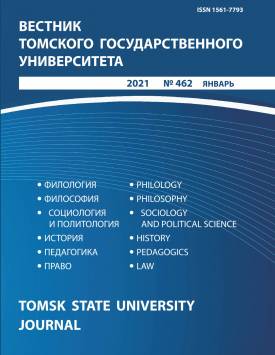On the Specificity of the Formation, Distribution and Translation of Memory in the Network Space
The article analyzes the main approaches in Russian and foreign literature in the study of the formation and functioning of memory in networks. The duality of interest in the topic of memory is noted. It is shown that, on the one hand, the network space opens up new perspectives for creating and distributing memory. Thus, digital technologies allow the creation, processing, storage and dissemination of information on a historically unprecedented scale, and many people with a wide variety of values, interests and expectations gain access to this information. Consumers may have alternative sources of information and need not use official archives. They can reproduce their personal historical experience by publishing family archives, articulating their own impressions of the past. Consumers get the opportunity for an individualized interpretation of the material. No wonder, many researchers mark the concept “prosumer” as blurring the lines between the consumer and the content producer. As a result, the formation of multidirectional memory and its decentralization are noted. Researchers highlight the abundance, ubiquity and responsiveness of digital media. At the same time, their institutionalized forms are supplemented, shifted and often forced to compete with information produced and disseminated by individual users. Moreover, contacts in and through digital media are not complementary to the usual forms of social interaction, but intertwined with them. On the other hand, the negative sides of the “boom” of memory, which researchers associate with the growth of amnesia intensified by this “boom”, and the deforming of commercialized memory are emphasized. First of all, it should be noted that openness also provided an opportunity to sound to the voices that can hardly be associated with democratic tendencies. This approach will enhance the nostalgic and thus mythologized memory. The role of the consumer context in which the interest in memory is realized is noted. This turns memory into just a type of product that is worth consuming simply to be modern. Also, the specificity of the functioning of communication provided by Internet platforms turns the past into one of the types of broadcast content and one of the tools for increasing the status of the user. It is not without reason that a number of authors believe that it is more reasonable to speak not about the “boom” of memory, but about the growing pace of oblivion, where the dominance of the above-described forms of memory only enhances it. I believe that attention to such forms of memory is necessary to increase reflexivity when discussing the issue of working out those productive goals and tasks that are assigned to the memory of the past.
Keywords
memory, memory “boom”, post-memory, prosthetic memory, digitalization, connective turn, network space, network spaceAuthors
| Name | Organization | |
| Syrov Vasily N. | Tomsk State University | narrat59@gmail.com |
References

On the Specificity of the Formation, Distribution and Translation of Memory in the Network Space | Vestnik Tomskogo gosudarstvennogo universiteta – Tomsk State University Journal. 2021. № 462. DOI: 10.17223/15617793/462/11
